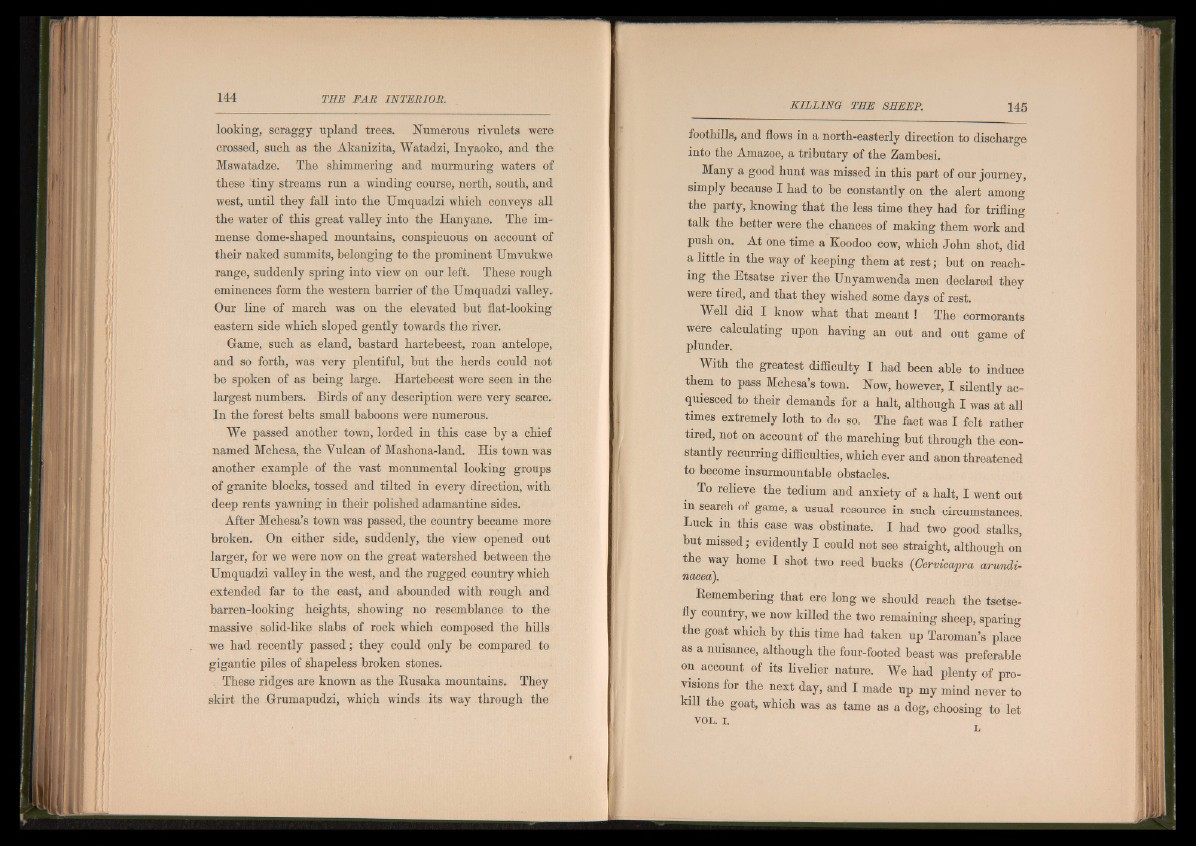
looking, scraggy upland trees. Numerous rivulets were
crossed, such as the Akanizita, Watadzi, Inyaoko, and the
Mswatadze. The shimmering and murmuring waters of
these tiny streams run a winding course, north, south, and
west, until they fall into the Umquadzi which conveys all
the water of this great valley into the Hanyane. The immense
dome-shaped mountains, conspicuous on account of
their naked summits, belonging to the prominent Umvukwe
range, suddenly spring into view on our left. These rough
eminences form the western barrier of the Umquadzi valley.
Our line of march was on the elevated but flat-looking
eastern side which sloped gently towards the river.
Game, such as eland, bastard hartebeest, roan antelope,
and so forth, was very plentiful, but the herds could not
be spoken of as being large. Hartebeest were seen in the
largest numbers. Birds of any description were very scarce.
In the forest belts small baboons were numerous.
We passed another town, lorded in this case by a chief
named Mchesa, the Vulcan of Mashona-land. His town was
another example of the vast monumental looking groups
of granite blocks, tossed and tilted in every direction, with
deep rents yawning in their polished adamantine sides.
After Mchesa’s town was passed, the country became more
broken. On either side, suddenly, the view opened out
larger, for we were now on the great watershed between the
Umquadzi valley in the west, and the rugged country which
extended far to the east, and abounded with rough and
barren-looking heights, showing no resemblance to the
massive solid-like slabs of rock which composed the hills
we had recently passed; they could only be compared to
gigantic piles of shapeless broken stones.
These ridges are known as the Eusaka mountains. They
skirt the Grumapudzi, which winds its way through the
foothills, and flows in a north-easterly direction to discharge
into the Amazoe, a tributary of the Zambesi.
Many a good hunt was missed in this part of our journey,
simply because I had to be constantly on the alert among
the party, knowing that the less time they had for trifling
talk the better were the chances of making them work and
push on. At one time a Koodoo cow, which John shot, did
a little in the way of keeping them at rest; but on reaching
the Etsatse river the Unyamwenda men declared they
were tired, and that they wished some days of rest.
Well did I know what that meant ! The cormorants
were calculating upon having an out and out game of
plunder.
With the greatest difficulty I had been able to induce
them to pass Mchesa’s town. Now, however, I silently acquiesced
to their demands for a halt, although I was at all
times extremely loth to do so. The fact was I felt rather
tired, not on account of the marching but through the constantly
recurring difficulties, which ever and anon threatened
to become insurmountable obstacles.
To relieve the tedium and anxiety of a halt, I went out
m search of game, a usual resource in such circumstances.
Luck in this case was obstinate. I had two good stalks,
but missed; evidently I could not see straight, although on
the way home I shot two reed bucks (Gervicapra arundi-
nacea).
Eemembering that ere long we should reach the tsetse-
fly country, we now killed the two remaining sheep, sparing
the goat which by this time had taken up Taroman’s place
as a nuisance, although the four-footed beast was preferable
on account of its livelier nature. We had plenty of provisions
for the next day, and I made up my mind never to
kill the goat, which was as tame as a dog, choosing to let
VOL. I.